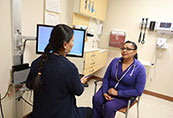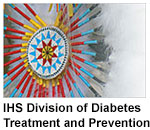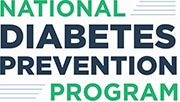Diabetes Standards of Care and Resources for Clinicians and Educators
Diabetes Prevention
People may have prediabetes for many years and not be aware of it. Of the individuals who have prediabetes, many will progress to type 2 diabetes over time. Identifying prediabetes gives the patient and health care provider an opportunity to engage in an effort to prevent or delay the onset of diabetes. This can be done by implementing lifestyle change interventions, such as reducing weight and increasing physical activity, and/or taking medication.
Resource Links
for All Topics
» Online version
» Print version [PDF – 269 KB]
Clinical Practice Recommendations
Recommendations for Diabetes Prevention
Screening methods for prediabetes are described in the Diabetes Screening and Prevention Algorithm [PDF – 157 KB]. The diagnosis of prediabetes can be made based on any of the following test results:
- A1C level of 5.7% to 6.4%
- Fasting plasma glucose level of 100 mg/dL to 125 mg/dL
- 2-hour plasma glucose value of 140 mg/dL to 199 mg/dL during a 75-gm oral glucose tolerance test
People with values in the upper ends of these test ranges have a greater risk of developing diabetes than people with values at the lower ends.
Lifestyle Interventions
The National Institutes of Health Diabetes Prevention Program (DPP) clinical trial found that an intensive lifestyle intervention (ILI) lowered diabetes incidence by 58% in individuals at high risk for diabetes.1 The 16-session ILI program established a weight loss goal of 7% from baseline and a physical activity goal of 150 minutes per week. The reduction in diabetes incidence with the ILI was similar in all racial subgroups, including American Indian people.
The Special Diabetes Program for Indians Diabetes Prevention demonstration project showed that a Native Lifestyle Balance Curriculum (modified 16-session, 6-month DPP ILI curriculum) could be successfully implemented in American Indian/Alaska Native (AI/AN) communities.2
Resources on lifestyle intervention programs for diabetes prevention:
- The Centers for Disease Control and Prevention (CDC) offers curricula and formal recognition of lifestyle change programs through the National DPP. Exit Disclaimer: You Are Leaving www.ihs.gov
- The Medicare Diabetes Prevention Program Expanded Model Exit Disclaimer: You Are Leaving www.ihs.gov offers reimbursement for Medicare beneficiaries participating in CDC-recognized diabetes prevention programs.
Metformin
Medications can prevent or delay the progression to diabetes. Metformin, an anti-hyperglycemic agent, reduced diabetes incidence by 31% in the National Institutes of Health DPP trial.1 Metformin is most effective for diabetes prevention in adults with prediabetes and any of the following characteristics:
- Body mass index of at least 35 kg/m2
- Age less than 60 years
- History of gestational diabetes mellitus
Note: Metformin is U.S. Food and Drug Administration (FDA)-approved for hyperglycemia treatment in people with type 2 diabetes, but not for diabetes prevention.
Other Medications
Several other medications have been shown to prevent or delay diabetes in people with prediabetes. Weight loss drugs, such as orlistat and topiramate-phentermine, and anti-diabetes agents, including GLP-1 receptor agonists, dual GIP/GLP-1 receptor agonists, acarbose, and pioglitazone reduce the rate of diabetes development in people at-risk for diabetes. However, there are currently no FDA-approved medications for diabetes prevention. Providers should discuss the risks and benefits of these agents with patients before prescribing them for diabetes prevention.
References
- Knowler W, Barrett-Connor E, Fowler SE, Hamman RF, Lachin JM, Walker EA, Nathan DM; DPP Research Group. A randomized clinical trial to prevent type 2 diabetes in persons at high risk. N Engl J Med 2002;346:393-403. DOI: 10.1056/NEJMoa012512
- Jiang L, Manson SM, Beals J, Henderson WG, Huang H, Acton KJ, Roubideaux Y; Special Diabetes Program for Indians Diabetes Prevention Demonstration Project. Translating the Diabetes Prevention Program into American Indian and Alaska Native communities: Results from the Special Diabetes Program for Indians Diabetes Prevention demonstration project. Diabetes Care 2013;36:2027-2034. https://doi.org/10.2337/dc12-1250
Clinician and Educator Resources
Featured Diabetes Prevention Resources
Patient Education Resources
Diabetes Prevention Patient Education Resources
| Organization | Resource |
|---|---|
|
Many culturally relevant educational materials are available from the IHS Division of Diabetes Treatment and Prevention. |
|
Native Diabetes Wellness Program Exit Disclaimer: You Are Leaving www.ihs.gov Preventing Type 2 Diabetes Exit Disclaimer: You Are Leaving www.ihs.gov |
CME Training
| Session Title | Session Material | CME/CE Information |
|---|---|---|
New Our Prayer: Healthy Future Generations as a Result of the Healthy Diné Nation Act of 2014 Exit Disclaimer: You Are Leaving www.ihs.gov
Denisa Livingston
Diné Community Advocacy Alliance (Originally presented on 07/24/2024) |
Take Quiz |
|
New Expanding Access to the National Diabetes Prevention Program in Indian Country Exit Disclaimer: You Are Leaving www.ihs.gov
Miriam T. Bell MPH
National Diabetes Prevention Program Division of Diabetes Translation National Center for Chronic Disease Prevention and Health Promotion Centers for Disease Control and Prevention Kavitha Muthuswamy MPH Division of Diabetes Translation National Center for Chronic Disease Prevention and Health Promotion Centers for Disease Control and Prevention Dolores Addison MPH, RDN Division of Diabetes Translation National Center for Chronic Disease Prevention and Health Promotion Centers for Disease Control and Prevention (Originally presented on 05/15/2024) |
Take Quiz |
|
New Evaluation and Management of Pediatric Obesity: An Overview of the AAP Clinical Practice Guideline Exit Disclaimer: You Are Leaving www.ihs.gov
Ashley Weedn MD, MPH, FAAP
University of Oklahoma Health Sciences Center Medical Director, Healthy Futures Clinic, OU Health (Originally presented on 03/27/2024) |
Take Quiz |
|
New Healthy Food, Healthy People-Tribal Laws and Policies that Support Access to Healthy, Indigenous Foods Exit Disclaimer: You Are Leaving www.ihs.gov
Julie Ralston Aoki JD
Public Health Law Center (Originally presented on 03/13/2024) |
Take Quiz |
|
|
Jane K. Dickinson RN, PhD, CDCES
Teachers College Columbia University (Originally presented on 09/13/2023) |
Take Quiz |
|
New Health Coaching: Practitioner Perspectives in Improving Health Outcomes Exit Disclaimer: You Are Leaving www.ihs.gov
Jill Breyen MS, RDN, CDCES
Red Lake Comprehensive Health Services Red Lake Indian Hospital (Originally presented on 09/06/2023) |
Take Quiz |
|
New An Overview of "On the TRAIL to Diabetes Prevention" Exit Disclaimer: You Are Leaving www.ihs.gov
Carla Knapp
National Vice President of Native Services Boys Girls Clubs of America Kelly Crowe Sr. Director Federal Grants Impact and Performance Boys & Girls Clubs of America (Originally presented on 08/23/2023) |
Take Quiz |
|
New Insulin Resistance: Explanations and Treatment Approaches Exit Disclaimer: You Are Leaving www.ihs.gov
Rachel Blair MD
Associate Physician and Instructor of Medicine Margo Hudson MD Associate Physician and Assistant Professor of Medicine Brigham and Women's Hospital, Harvard Medical School (Originally presented on 07/05/2023) |
Take Quiz |
|
|
Michelle Archuleta MA, MS
HQs Indian Health Service Alyssa Fine RN, MSN, CDCES, CNL Cowlitz Indian Tribe Health Clinic LCDR, US Public Health Service (Originally presented on 05/24/2023) |
Take Quiz |
|
New Cardiovascular Risk Stratification in American Indians Exit Disclaimer: You Are Leaving www.ihs.gov
Jason Deen MD
Associate Professor of Pediatrics and Medicine Divisions of Cardiology University of Washington School of Medicine (Originally presented on 02/01/2023) |
Take Quiz |
|
New The Impact of Social Determinants of Health on Type 2 Diabetes in Indigenous Communities Exit Disclaimer: You Are Leaving www.ihs.gov
Dr. Melissa Walls
Sid Kellar (Originally presented on 12/21/2022) |
Take Quiz |
|
New An All-of-Government Approach to Diabetes Prevention and Control: Report from the 2022 Federal Diabetes Commission Exit Disclaimer: You Are Leaving www.ihs.gov
Dean Schillinger MD
Division of General Internal Medicine (Originally presented on 11/09/2022) |
Take Quiz |
|
New Case Management: Practicing Population Health to Engage Patients as Partners in Care Exit Disclaimer: You Are Leaving www.ihs.gov
Krista Haven RN, MSN, CDE
(Originally presented on 11/02/2022) |
Take Quiz |
|
New Using the Nutrition Facts Label to Achieve the Healthy People 2030 Goals Exit Disclaimer: You Are Leaving www.ihs.gov
Mark A. Kantor Ph.D.
(Originally presented on 10/19/2022) |
Take Quiz |
|
New The Social Determinants of Health: How the Context in Which We Live Impacts Health Exit Disclaimer: You Are Leaving www.ihs.gov
Jana Towne RN, BSN, MHA
Division of Diabetes Treatment and Prevention (Originally presented on 08/17/2022) |
Take Quiz |
|
New Helping Your Patients with Diabetes Slow the Progression of Diabetic Kidney Disease in T2DM; Part 1 – Screening, Diagnosis & Monitoring Exit Disclaimer: You Are Leaving www.ihs.gov
Carol Greenlee MD MACP
Western Slope Endocrinology (Originally presented on 08/03/2022) |
Take Quiz |
|










